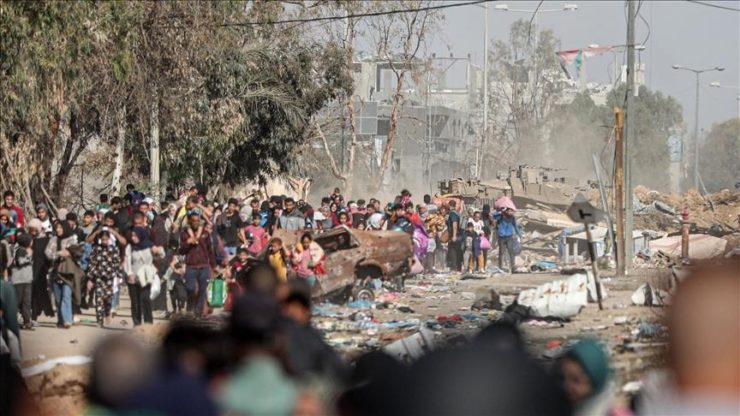
Since October 7, 2023, Israel has been conducting indiscriminate genocidal operations in the Gaza Strip. According to the United Nations, the number of Palestinians killed, or maimed in this war has exceeded, 100000 since the commencement of the war. Persistent Israeli genocide in Gaza even poses a long-term threat to the global environment. Heavy usage of lethal ammunition by the Israeli forces has done irreversible damage to the climate. Sources suggest that Israel has used 65000 tons of explosives in Gaza, which is equivalent to more than 3 times the firepower that the nuclear bomb dropped by the US on Japan. Climate activists around the world are concerned over this aspect of the Israeli genocide in the Gaza enclave.
In December 2023, COP 28 was held in Dubai. Around 85000 participants, from various factions of life, attended this conference. The prime focus of this conference was to assess the progress of nations under the Paris Agreement and devise a strategy for securing the future of the world. The inauguration of the Loss and Damage Fund to support the rehabilitation process in the countries affected by climate change is marked as a historic achievement of this summit. Another major breakthrough at the summit was the agreement to gradually phase out the usage of fossil fuels to achieve net-zero emissions by the year 2050. A consensus of more than 100 countries was achieved to triple the capacity of renewable energy by 2030. This move is considered a significant step towards cleaner and green energy sources. Parties at the conference also acknowledged the need to bolster international cooperation by accepting funding from the private sector. A 30 billion USD investment by the private market fund was introduced at the summit to support climate-resilient and low-carbon projects in developing countries. However, the exclusion of impacts of ongoing conflicts, especially in Gaza, has undermined the effective implementation of these goals.
Military conflicts have a direct impact on climate change. The latter results in squeezing resources in a region, which results in a violent conflict for the limited number of resources that are available. Climate change intensifies conflicts by further exacerbating its economic, political, and social aspects. On the other hand, endeavors intended to counter climate change sometimes lead to molding the economic and social factors, which can result in unanticipated consequences in the conflict-prone region. Land degradation and massive displacements occurring due to conflicts also affect the climate.
The Middle Eastern region is one of the most vulnerable regions to climate change. Climate change in the region can have a negative effect on the agricultural yield, and water supplies in the Middle East, which can further deteriorate the security situation in the region. Reports suggest that the Middle East and North Africa (MENA) host 6 percent of the global population. However, the region occupies less than 2 percent of the global renewable water supply, which makes it the driest region of the world. Amidst the rapidly increasing population, the MENA region is home to 17 most water-stressed nations, according to UNICEF. Deaths in the region due to extreme heatwaves could surge to 123/100000 people from 2/100000 people by the end of the century as per the estimates.
According to the latest data, the Middle East region has faced 107 water-related conflicts, 60 percent of which were between Palestine and Israel – since 2022. Water facilities belonging to the Palestinians have been demolished by the Israeli settlers in Gaza and the West Bank. This has resulted in numerous violent conflicts between the Palestinians and the Israeli Armed Forces. The current Israel-Hamas war has severely impacted the global environment. Indiscriminate bombings and aid disruption by the Israeli forces have resulted in massive displacement of the Gazans. This sparked a huge humanitarian disaster in the region. Israel’s use of white phosphorus on the Palestinians has a long-term impact on the climate as it will destroy the contamination of the arid soil along with other detrimental implications. The extent of the negative impact of the Israeli bombardment on Gaza could be gauged by the fact that, in merely the first 2 months of the war, the carbon emissions rates of the region exceeded that of more than 20 most climate-vulnerable countries of the world. According to research, more than 99 percent of this carbon dioxide emission was caused by the aerial and ground bombardment of the Israeli forces in Gaza in the first 60 days of the war.
The strikes conducted by the US and the UK on the Houthis in Yemen have also raised environmental concerns. Many leaders at the COP28 denounced the Israeli genocide in Gaza. The Iranian delegation even withdrew from the summit in protest of Israel’s participation. The UN Secretary-General, António Guterres, also criticized Israel’s actions in Gaza. However, despite the concerns of some political leaders, the summit remained oblivious to the plight of the Palestinians and the impacts of this war on climate change. The exclusion of the intersection between climate change and conflicts renders negative impacts on the effectiveness of the COP28 and the strategies formulated in it. Environmental activists around the world need to highlight the environmental impact of military conflicts. And coerce the policy-makers to consider this aspect while devising strategies to counter climate change.
Taut Bataut – is a researcher and writer that publishes on South Asian geopolitics, exclusively for the online magazine “New Eastern Outlook”.